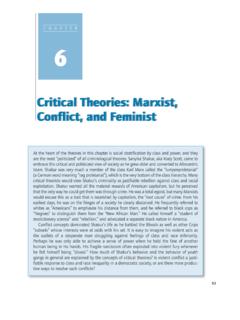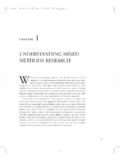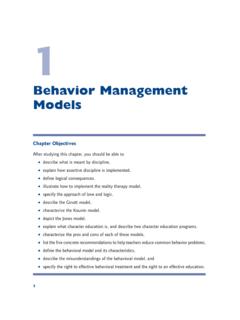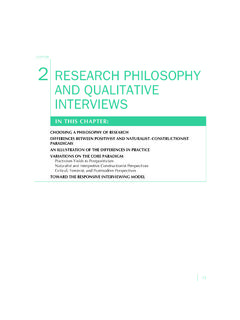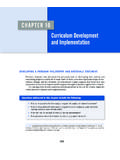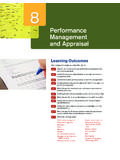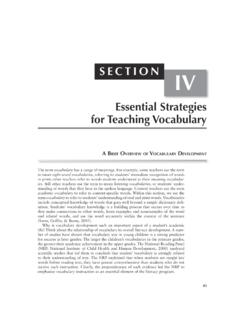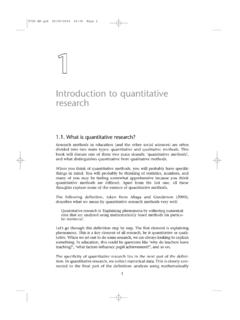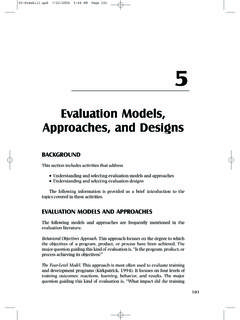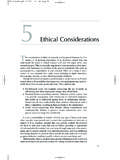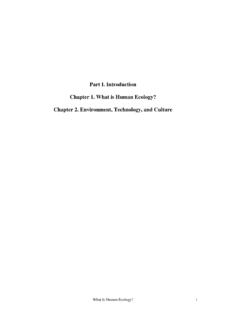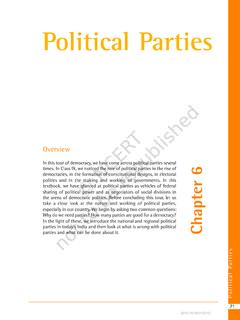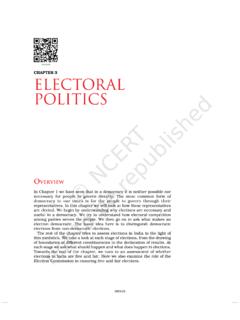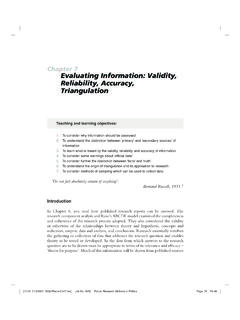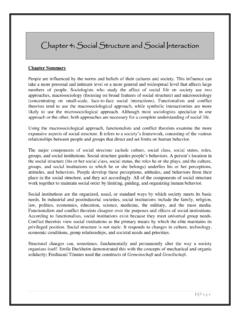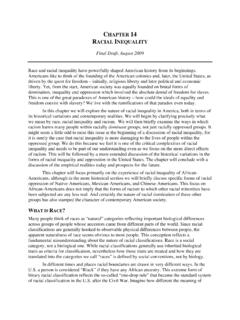Transcription of CHAPTER 5 MANAGING POWER AND POLITICS IN …
1 CCHHAAPPTTEERR 55 MMAANNAAGGIINNGG PPOOWWEERRAANNDD PPOOLLIITTIICCSS IINNOORRGGAANNIIZZAATTIIOONNSSRR eessiissttaannccee,, EEmmppoowweerrmmeenntt,, EEtthhiiccssOObbjjeeccttiivveess aanndd lleeaarrnniinngg oouuttccoommeessBy the end of this CHAPTER , you will be able to Appreciate that the central task of any manager is to manage peopleand that MANAGING people means MANAGING POWER relations Understand how POWER is played out in organizational structures Evaluate what might be bases for authority in organizations Grasp some of the central ethical issues involved in MANAGING POWER andauthority 6/7/2004 3:19 PM Page 151 Outline of the ChapterSetting the SceneCentral Approaches and Main TheoriesSources of PowerOrganizations as Political ArenasPower and the POLITICS of ResistanceCritical Issues: Soft Domination and HegemonySoft DominationElectronic SurveillanceEmpowerment?
2 Barker on Concertive ControlOrganizational Hegemony in the International Monetary FundThe Fine Print: The Extremes of PowerTotal InstitutionsThe Ethics of Organizational ObedienceManaging with Positive PowerSummary and ReviewOne More Time ..Additional Resources115522 PART II MANAGING 6/7/2004 3:19 PM Page 152 OOUUTTLLIINNEE OOFF TTHHEE CCHHAAPPTTEERRO rganizations are made up of formal and informal rules that coordinate actionsof different people. But how can organizations make sure that people whohave diverse backgrounds, particular interests, and different understandings comply with these rules? Raising these questions means addressing the fineline between the exercise of POWER and ethics.
3 Poweris the concept thatencompasses the mechanisms, processes, and dispositions that try, not alwayssuccessfully, to ensure that people act according to the rules of the , POWER is one of the central concepts in both management practice andtheory. Ethics, on the other hand, is concerned with doing the right things inthe right way. Of course, the whole issue of ethics depends in the first place onthe ethicality of the business proposition that underlies the organization. Is itethical, for example, to build a business on cheating?Researchers in organization theory and management in the era after WorldWar II era had developed a set of expectations about the exercise of POWER inorganizations that they had derived from the formal structure of bureaucraticauthority (Bennis, Berkowitz, Affinito, and Malone 1958).
4 However, a numberof case studies refuted these expectations. Surprisingly, these case studiesdiscovered bases of POWER outside the formal structure of authority anddescribed the games they sanctioned and the rules that made them recently, interest in discussions of POWER has shifted to issues of resis-tance how people in organizations resist formal organizational , perhaps of more pressing concern is not the question of why peopleresist but why they might obey, particularly where there are ethical issuesattached to what it is that they are obeying, issues that come into particularfocus when considering examples of extreme organizations that are known astotal we can learn a great deal from the concentrationof POWER that occurs in total institutions, in fact, most organizational POWER isneither so total nor so hard edged.
5 Instead of making people do what theywouldn t otherwise do, this POWER is subtler it operates through modes ofsoft 5 MANAGING POWER AND POLITICS IN ORGANIZATIONS115533 BBeeffoorree yyoouu ggeett famous thought by Lord Acton: POWER tends to corrupt and absolute POWER corrupts absolutely. Great men are almost always bad men, evenwhen they exercise influence and not authority: still more when you superadd the tendency or the certaintyof corruption by authority. Lord Acton, letter, 5 April 1887,to Bishop Mandell Creighton (Acton 1972) 6/7/2004 3:19 PM Page 153 SSEETTTTIINNGG TTHHEE SSCCEENNEEWe spend at least one third of our adult lives working in third disappears in sleep and replenishment, and a further third inthings we choose to do.
6 Therefore, for one third of our lives, we cede controlto others and enter into complex relations of POWER that range from othersgetting us to do things we would not otherwise do, to us doing the same toothers. We will spend that third of our lives in different organizations. At best,these will be warm, friendly, welcoming, open places in which we can do ourjobs with pride, growth, and achievement. At worst, however, they may be akinto places of concentrated POWER that frames and shapes our hours organization theorists began studying the empirical workings of organi-zations rather than simply constructing abstract models, they noticed that somemembers of organizations were able to exploit and use seemingly impersonalrules for their own ends.
7 The prevalent conception of organization hierarchyidentified it with legitimacy; thus, when actions were identified that seemedto subvert or bypass the official hierarchy of authority, they were labeled illegitimate they were not authorized. In this way, POWER came to be seenas illegitimate, whereas authority was legitimate. Certain resources withinorganizations seemed to provide bases for illegitimate expressions of II MANAGING ORGANIZATIONSI mage at work? 6/7/2004 3:19 PM Page 154At various times, several key resources have been promoted as the basis forexpert POWER in organizations. The most pervasive basis for arguing a specialrelationship between POWER and a specific resource relate to the ability to con-trol uncertainty in bureaucratic organizations.
8 More recently, there has been ashift in focus from bureaucracy to consideration of more empowered alterna-tives. But, as we shall see, empowerment is not necessarily all it is cracked upto be it can mean even tighter world of organization POWER is complex full of shifting alliances,words that mean something other than they say, and actions that do more thanthey proclaim. It is impossible to escape POWER in organizations, if onlybecause organization means yoking together people with multiple and com-plex interests whose search for satisfaction is structured through a set of orga-nizational relations with people that one would not necessarily choose to spendtime with. If you had a choice, would you spend eight hours a day with thepassing parade of megalomaniacs, incompetents, and cruelly brutal gossipsthat people most offices and other organizations?
9 When the boss tells you thathe wants everyone to work as one happy family, look around. Would youchoose any or all of these people as partners with whom to make a family? POWER is more profound than just the push and pull of attraction and repul-sion, command and control. It also involves the structuring of dispositions andcapacities for action as well as action itself. We explore these themes in thischapter, looking at the good, the bad, and the ugly in POWER relations. We takecare to concentrate not only on the negatives but also to accentuate the all, if POWER is inescapable, we might as well learn how to use it AAPPPPRROOAACCHHEESS AANNDD MMAAIINN TTHHEEOORRIIEESSSS oouurrcceess ooff ppoowweerrIf an organization makes people do things they normally wouldn t do, POWER must be the central issue.
10 Many potential sources or bases of powerhave been listed, including information; expertise; credibility; stature and pres-tige (Pettigrew 1973); uncertainty (Crozier 1964); access to top-level man-agers and the control of money, sanctions, and rewards (French and Raven1968; Benfari, Wilkinson and Orth 1986); and control over resources (Pfefferand Salancik 2002). We consider some of the more important of these bases ofpower in this works best when it is seen least. POWER as legitimation needs to donothing to secure its will if people already want to do what is expected of legitimacy can be created for individual actions, it greatly reduces theCHAPTER 5 MANAGING POWER AND POLITICS IN 6/7/2004 3:19 PM Page 155chance of opposition to them because it creates a meaningful context in whichthey can be accepted and justified (Edelman 1964; 1971).
